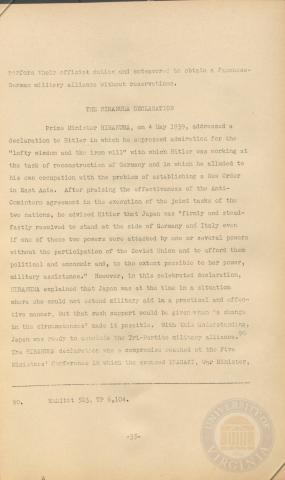
Page 35
| Parent | Japanese - German - Italian Collaboration |
|---|---|
| Date | |
| Language | English |
| Collection | Tavenner Papers & IMTFE Official Records |
| Box | Box 14 |
| Folder | Japan, Germany, Italy Collaboration and Introduction |
| Repository | University of Virginia Law Library |
perform their official duties and endeavored to obtain a Japanese German military alliance without reservations.
THE HIRANUMA DECLARATION
Prime Minister HIRANUMA, on 4 May 1939, addressed a declaration to Hitler in which he expressed admiration for the "lofty wisdom and the iron will" with which Hitler was working at the task of reconstruction of Germany and in which he alluded to his own occupation with the problem of establishing a New Order in East Asia. After praising the effectiveness of the Anti- Comintern agreement in the execution of the joint tasks of the two nations, he advised Hitler that Japan was "firmly and stead¬fastly resolved to stand at the side of Germany and Italy even if one of these two powers were attacked by one or several powers without the participation of the Soviet Union and to afford them political and economib and, to the extent possible to her power, military assistance." However, in this celebrated declaration, HIRANUMA explained that Japan was at the time in a situation where she could not extend military aid in a practical and effec¬tive manner, but that such support would be given when "a change
in the circumstances" made it possible. With this understanding,
Japan was ready to conclude the Tri-Partite military alliance.90 The HIRANUMA declaration was a compromise reached at the Five Ministers' Conference in which the accused ITAGAKI, War Minister
90Exhibit ?03, TP 6,104
